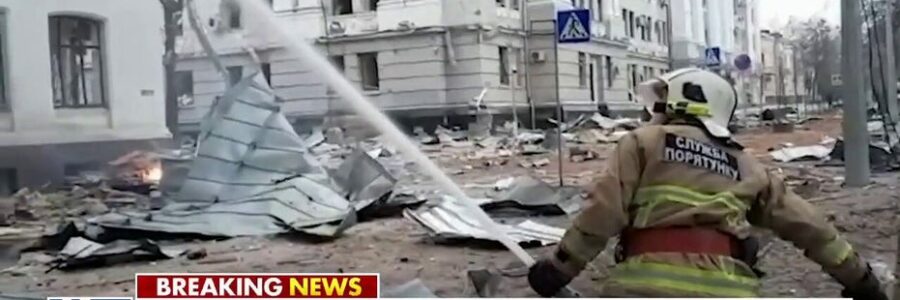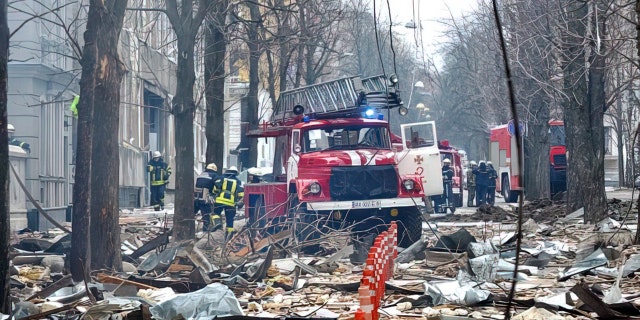
Combat operations in Ukraine are coming to a critical inflection point and Congress must act now
Kharkiv police building in Ukraine struck by Russian missile
Fox News correspondent Mike Tobin reports on the latest from Lviv, Ukraine.
Congress needs to expedite approval and delivery of a new significant package of military aid to Ukraine. We are both employees of or advisors to the Global Special Operations Force Foundation, the professional association for special operations, and we understand that we can’t wait until the middle of March for the United States to send aid.
Congress has an opportunity to quickly craft a proposal to send to the president this week. Time is of the essence. The battle for freedom and democracy in Ukraine is happening now and at a critical stage. This is the most consequential war since World War II because the outcome will shape international security structures for the next century, especially in Europe and Central Asia.
The conflict in Ukraine is a campaign that can’t be funded piecemeal. The required military material for Ukraine will exceed the $2.9 billion that is proposed in the $6.5 billion request from President Biden. Congress must approve $16.2 billion ($2.7 billion monthly for six months) to cover the required military and humanitarian aid.
President Joe Biden delivers his State of the Union address to a joint session of Congress at the Capitol, Tuesday, March 1, 2022.
(Saul Loeb, Pool via AP)
Combat operations are coming to a critical inflection point whereby both sides need to replenish supplies to the fighting forces and sustain the civilian populace. The question for both sides is who will run out of supplies logistically first, thus providing either the attacker or defender a substantial, if not decisive, advantage.
The most urgent needs are to resupply the Ukrainians to defend themselves against unrestricted Russian aggression. The Ukrainian Armed Forces and populace are fighting effectively in many places but are outnumbered and often outgunned. The Russians have superior mobility and firepower but lack the essential local knowledge and the will to fight this fight.
Once major cities are surrounded, and the eastern half of the Dnipro is secured, it will become attrition warfare after that. It is a matter of time before Kyiv runs out of ammunition, water, food, power, and civil necessities to keep society functioning.
Firefighters work to contain a fire in buildings housing the Kharkiv regional SBU security service and the regional police, allegedly hit by Russian shelling in Kharkiv on March 2, 2022.
(Sergey Bobok/AFP via Getty Images)
The United States has the capabilities to provide decisive aid to Ukrainian resistance forces. Ukrainian armed forces and defenders need to have the power, material, and capabilities to deny Russian resupply ground and air routes. They need the capabilities to break Russian encirclement perimeters. They need the resources to sustain the population’s basic needs during the length of the conflict while preparing for Russian occupation. Finally, they need to have the aid to expel Russian invasion forces from Ukraine’s territory.
Without immediate support, the Ukrainian resistance will be doomed.
There is a long list of general combat, armed forces, and supporting territorial needs, including ammunition for small arms, crew-serviced, and vehicle-mounted weapons of which the Ukrainian resistance has a need. The resistance needs tank and artillery ammunition of various calibers. They also need anti-tank munitions such as the Javelin missile and launchers with spare batteries, the AT-4, NLAW, and Karl Gustav weapon system.
An aid package should help them secure night vision devices to include individual night vision goggles and aiming devices, and night vision and thermal/infrared sights for crew-served weapons. Finally, they need Stinger anti-aircraft systems, hand-held (secure) communications, small tactical drones, individual protective equipment, field rations, and field medical kits. All of these are immediate military needs that should be sent as quickly as possible to the resistance in Ukraine through reliable supply routes.
A view of damaged regional police station after a Russian missile attack in Kharkiv, Ukraine on March 2, 2022.
(State Emergency Service of Ukraine/Handout/Anadolu Agency via Getty Images))
There is another bucket of aid in the form of support for the command and leadership in Ukraine. They need secure, long-range communications base stations and associated antennas. There needs to be aid to reconstitute the Ukrainian psychological operations facilities destroyed by Russian missile strikes. Remote portable TVs, radios, and an alternative secure internet communications system that do not have to rely on land-based communications that transit through Russia are needed. Finally, there needs to be an information and broadcast center that can reach into Russia to counter the Kremlin’s disinformation.
An aid package should designate funds for humanitarian support for Ukraine, Poland and Romania to deal with the humanitarian crisis. Emergency communications, pioneer equipment, hand tools, sensors, urban rescue supplies, temporary shelter materials, use of U.S. Foreign Disaster Assistance warehouse supplies, and Internally Displaced Persons (IDP) camp sets and kits will help the victims of this aggression.
Resistance forces need aid to be armed and trained with lethal munitions, weapons, secure communications, supporting equipment, secure basing, infrastructure, basic life support for developing, training to support Ukrainian resistance forces. Clothing, equipment, weapons, and ammunition for training and employment should also be a part of the lethal aid provided that should also provide secure communications and transportation capabilities.
Congress is working on a supplemental that could be added to the FY22 appropriations package. That plan should be comprehensive and specific. The problem with this plan is that it will not be signed until March 11, 2022, at the earliest. That is too late. Without immediate support, the Ukrainian resistance will be doomed.
Congress and our federal government need to move at the speed of war if we wish to see democracy protected in Ukraine. Excessive bureaucratic burdens and processes will potentially cause the provision of this support to arrive late or well after Russia has defeated Ukrainian forces.
Col. (Ret.) Stuart W. Bradin established the NATO Special Operations Forces headquarters. He is President and CEO of The Global Special Operations Forces (SOF) Foundation (GSOF) is a 501(c)(3) non-profit organization that is the national military association for special operations.
Major General (retired) Michael S. Repass was the commander of Special Operations Command Europe (SOCEUR) and is a GSOF Advisory Council Member. He is the Chief Executive Officer of Able Global Solutions, LLC which he founded in 2013 after retiring from the Army. Repass is a well-known expert on Ukrainian affairs.
Source: Read Full Article






